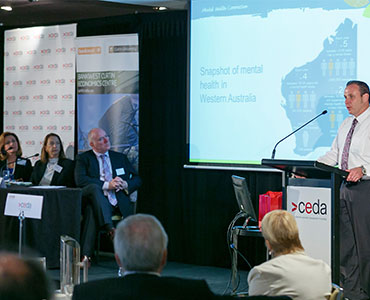Ignoring mental health is costing Australian businesses $48.9 billion per year* due to costs associated with unemployment, days of absence, reduced labour income as well as time off for staff to care for someone, said Western Australia Mental Health Commissioner, Tim Marney.
 Speaking at the Perth launch of CEDA’s latest research report, Addressing entrenched disadvantage in Australia, Mr Marney said the Western Australia Government has refocused to address issues early and provide person centred care.
Speaking at the Perth launch of CEDA’s latest research report, Addressing entrenched disadvantage in Australia, Mr Marney said the Western Australia Government has refocused to address issues early and provide person centred care.
“Being able to deal with the individual rather than the symptoms they are presenting is absolutely crucial,” he said.
“Over the next 10 years…what we hope to achieve is reduced mental illness, suicide, drug and alcohol problems. We want a sustainable and integrated, not fragmented, system that focuses on the individual and their needs, and tries to keep them closer to home so that their natural support system is not severed in their recovery process.”
Mr Marney also said that embedding mental well-being into the workplace was essential to support those suffering mental illness and aid in their recovery, as well as reduce the severity of economic impact.
“In an economy that is struggling and has struggled for the past decade to generate productivity, creating mentally healthy workplaces has the potential to increase productivity by two per cent,” he said.
“For every dollar spent…the return on creating a mentally healthy workplace on average across all industries is $2.30. In public administration including health, water, and power, the return is $5.70. The return for construction and mining is also $5.70. Take public service, mining and construction and you have 80 per cent of Western Australia’s workforce.”
University of Wollongong Professor of Mental Health Nursing, and report contributor, Professor Lorna Moxham said with one in five people suffering from mental illness living in entrenched disadvantage, “we can’t keep discussing mental health or mental illness as something that happens to other people.”
“Early intervention means a lot of things, it doesn’t only mean getting hold of someone early, and putting them on medication… Medication has its place, but it’s only one tool in the tool box.
“We recommend early interventions in a community setting…What seem to be missing are more targeted early intervention programs that can break this cycle of poverty.”
Youth Focus, Chief Executive Officer, Jenny Allen, said that Western Australia has the second highest suicide rate in Australia, and subsequently, government alone could not address this issue.
She said a system that is outcomes focused, not outputs focused, is needed.
“The corporate world, the communities and those able to assist in all ways need to come together to address what is a really awful indictment on our society today,” she said.
CEDA’s report, Addressing entrenched disadvantage in Australia was released on 21 April, 2015. Click here to read more about the report.
*Government of Western Australia Mental Health Commission